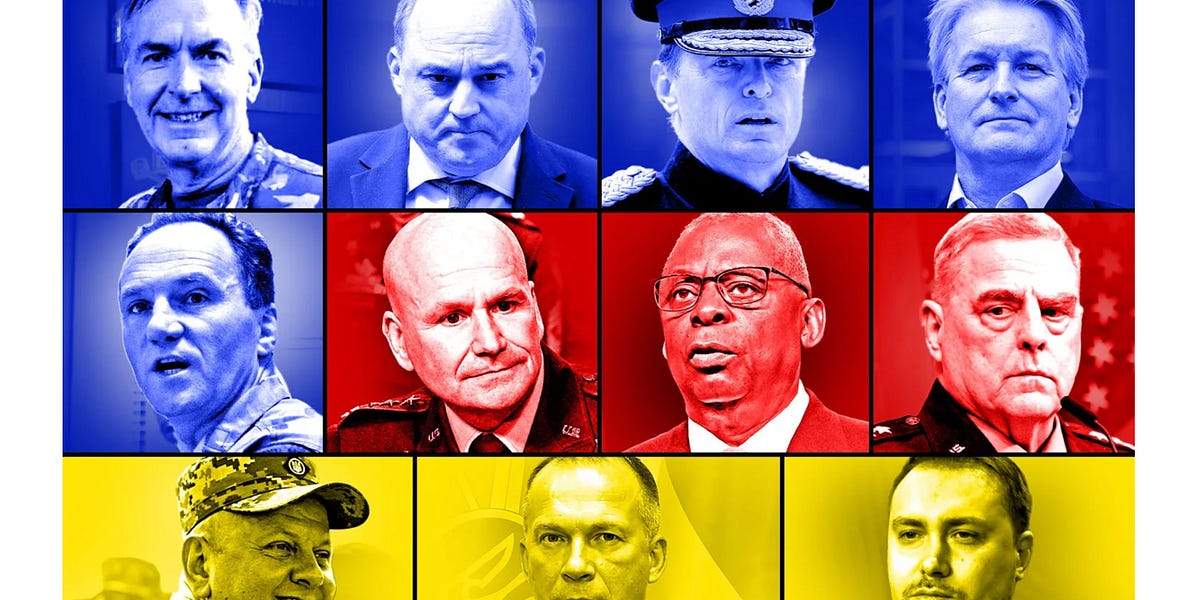You are using an out of date browser. It may not display this or other websites correctly.
You should upgrade or use an alternative browser.
You should upgrade or use an alternative browser.
Ukraine / Russian War
- Thread starter GURPS
- Start date
Trump Refuses $50 Billion Agreement With Ukraine, Will Not Sell Kiev Regime Patriot Air Defense Systems and Missiles
The European Liberal-Globalist media is slowly and painfully awakening to the reality of US President Donald J. Trump’s new approach toward Ukraine policy.
The last time Kiev’s embattled leader backtracked on a previously agreed Mineral Deal, we heard Trump warn that ‘he was going to have big, big problems’.

And it seems that it’s already started, as reports arise that he has passed on a $50 billion deal with Kiev – funded with EU money.
Among many other priorities, Ukraine urgently needs new air defense systems.
PJay
Well-Known Member
3rd Would-Be Trump Assassin Plotted with Telegram Account Linked to Ukrainian Cell Number — We’ve Identified the Account and Individual It’s Registered To

 www.thegatewaypundit.com
www.thegatewaypundit.com

BREAKING: 3rd Would-Be Trump Assassin Plotted with Telegram Account Linked to Ukrainian Cell Number — We’ve Identified the Account and Individual It’s Registered To | The Gateway Pundit | by Jason Sullivan
Azov Battalion, Assassination Plot, President Trump, Ukraine, Nazi, Organizations
Another corporate media narrative has been wadded up and thrown away now that its usefulness has expired. This week, the Wall Street Journal ran an astonishing bit of narrative turnabout, in a new limited hangout headlined, “The Russian Military Moves That Have Europe on Edge.” Ukraine-flag-in-bio types cried themselves to sleep last night.

For Portland readers, who may have missed the last four years of Proxy War narrative spinning, the media has constantly assured everyone that Russia has only gained ground in Ukraine through mountains of dead soldiers and piles of droned military equipment. According to media, Moscow’s mad dictator only progressed by irrationally shoveling Russian bodies into a Gettysburg-style sausage-grinder of his own creation, while the plucky Ukrainian defenders pick enemy soldiers off by the dozens.
But now they tell us that Russia’s army is bigger than ever. “Putin has ordered the military to expand its ranks,” the Journal admitted, “to as many as 1.5 million troops, up from around one million before the Ukraine invasion.” It pointed out that, before the invasion in 2021, Russia had built only about 40 total of its flagship T-90M battle tanks. But now, explained the story, “it is producing nearly 300 a year.”
“Russia’s recent production of military equipment,” it added flatly, “has more than made up for what it is losing in Ukraine.”
That was an astonishing narrative pivot. But the irony got even thicker. According to the Journal, most of Russia’s new tanks and other equipment aren’t even being deployed to Ukraine. Russia is stockpiling them. “Almost none are being sent to the front line in Ukraine, but are staying on Russian soil for later use,” said one Finnish official.
In other words, Russia hasn’t yet committed its best effort to the fight. Behold this stunning admission: “Most of what is being sent to the front line in Ukraine is old and refurbished Soviet-era arms.” The Russians are battling Ukraine with one arm held behind their back.
The article did not explain how Ukraine can possibly win if Russia decides to start trying.
 If NATO fought the Proxy War to starve Russia through a war of attrition, it failed. “The Russian military is reconstituting and growing at a faster rate than most analysts had anticipated,” General Christopher Cavoli, commander of U.S. forces in Europe, bluntly told a Senate committee this month. “In fact, the Russian army, which has borne the brunt of combat, is today larger than it was at the beginning of the war.”
If NATO fought the Proxy War to starve Russia through a war of attrition, it failed. “The Russian military is reconstituting and growing at a faster rate than most analysts had anticipated,” General Christopher Cavoli, commander of U.S. forces in Europe, bluntly told a Senate committee this month. “In fact, the Russian army, which has borne the brunt of combat, is today larger than it was at the beginning of the war.”
Weird. Russia is winning by losing so much. Media somehow holds an irresolvable logical conundrum, one posed by simultaneously believing that “Russia is throwing all its men and material at the war” but also that “Russia’s army is getting bigger by the minute.”
 The new narrative pivot isn’t accidental. It is a feeble and obvious attempt to scare Western officials into doubling down on the Proxy War, based on the insane notion that doing even more of the same failed military strategy will somehow bring the Russian bear to heel, instead of just making its army swell even bigger and become even more well-equipped, or possibly leading to a catastrophic defeat in Ukraine when Russia decides to finally get down to business.
The new narrative pivot isn’t accidental. It is a feeble and obvious attempt to scare Western officials into doubling down on the Proxy War, based on the insane notion that doing even more of the same failed military strategy will somehow bring the Russian bear to heel, instead of just making its army swell even bigger and become even more well-equipped, or possibly leading to a catastrophic defeat in Ukraine when Russia decides to finally get down to business.
Also omitted by the article was any discussion of how Biden’s idiotic policy of letting Ukraine fire anti-personnel missiles over Russian beaches may have contributed to the buildup. Nor did it speculate about what the Russian people might be thinking of constant European threats to send armies of EU “peacekeepers” to help Ukraine kill more Russians.
Speaking of those threats, what is even more bizarre about all the bellicose European braggadocio is their utter inability to follow through with the threats. Consider this remarkable headline from this week’s Times of London:

Compare that puny 25,000 best-case estimate to Russia’s experienced 1.5 million-man army.
The 25,000 figure emerged from a series of “emergency” EU meetings to counter the Russian Menace. “The discussions,” the Times reported without a scrap of irony, “expose how reliant Britain and Europe are on the US when it comes to providing a serious deterrent to Russia.”

 www.coffeeandcovid.com
www.coffeeandcovid.com

For Portland readers, who may have missed the last four years of Proxy War narrative spinning, the media has constantly assured everyone that Russia has only gained ground in Ukraine through mountains of dead soldiers and piles of droned military equipment. According to media, Moscow’s mad dictator only progressed by irrationally shoveling Russian bodies into a Gettysburg-style sausage-grinder of his own creation, while the plucky Ukrainian defenders pick enemy soldiers off by the dozens.
But now they tell us that Russia’s army is bigger than ever. “Putin has ordered the military to expand its ranks,” the Journal admitted, “to as many as 1.5 million troops, up from around one million before the Ukraine invasion.” It pointed out that, before the invasion in 2021, Russia had built only about 40 total of its flagship T-90M battle tanks. But now, explained the story, “it is producing nearly 300 a year.”
“Russia’s recent production of military equipment,” it added flatly, “has more than made up for what it is losing in Ukraine.”
That was an astonishing narrative pivot. But the irony got even thicker. According to the Journal, most of Russia’s new tanks and other equipment aren’t even being deployed to Ukraine. Russia is stockpiling them. “Almost none are being sent to the front line in Ukraine, but are staying on Russian soil for later use,” said one Finnish official.
In other words, Russia hasn’t yet committed its best effort to the fight. Behold this stunning admission: “Most of what is being sent to the front line in Ukraine is old and refurbished Soviet-era arms.” The Russians are battling Ukraine with one arm held behind their back.
The article did not explain how Ukraine can possibly win if Russia decides to start trying.
Weird. Russia is winning by losing so much. Media somehow holds an irresolvable logical conundrum, one posed by simultaneously believing that “Russia is throwing all its men and material at the war” but also that “Russia’s army is getting bigger by the minute.”
Also omitted by the article was any discussion of how Biden’s idiotic policy of letting Ukraine fire anti-personnel missiles over Russian beaches may have contributed to the buildup. Nor did it speculate about what the Russian people might be thinking of constant European threats to send armies of EU “peacekeepers” to help Ukraine kill more Russians.
Speaking of those threats, what is even more bizarre about all the bellicose European braggadocio is their utter inability to follow through with the threats. Consider this remarkable headline from this week’s Times of London:

Compare that puny 25,000 best-case estimate to Russia’s experienced 1.5 million-man army.
The 25,000 figure emerged from a series of “emergency” EU meetings to counter the Russian Menace. “The discussions,” the Times reported without a scrap of irony, “expose how reliant Britain and Europe are on the US when it comes to providing a serious deterrent to Russia.”

☕️ SAFE BUT RISKY ☙ Saturday, May 3, 2025 ☙ C&C NEWS 🦠
Most damning jab study yet drops to media silence; Ashli Babbitt case settles; Trump locks in his first 100 days; Florida reins in amendments; Russia 'unexpectedly' rises; EU fumbles for a fight.
RemovePaywall | Free online paywall remover
Remove Paywall, free online paywall remover. Get access to articles without having to pay or login. Works on Bloomberg and hundreds more.
Hijinx
Well-Known Member
Who are the people who are sitting there having to listen to this clown actor.
Truth bomb or not this ass whole has no credibility IMO.
